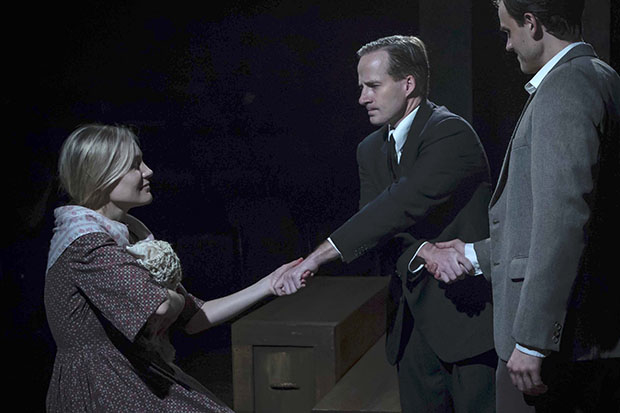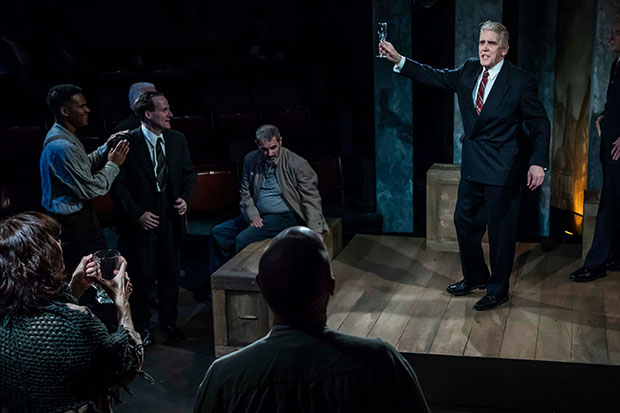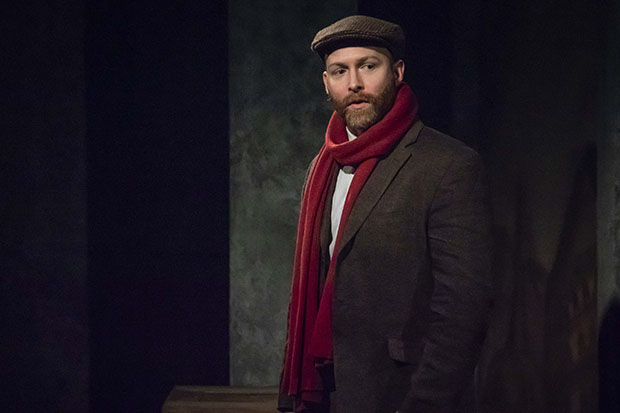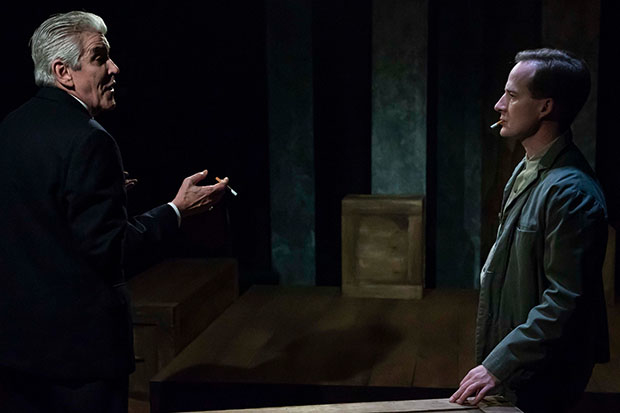Shadow of Heroes and the Echo of History
The Metropolitan Playhouse presents the first New York revival of Robert Ardrey’s play about the years between the Nazi occupation of Hungary and the revolution of 1956.

(© Emily Hewitt)
Ascending the stairs to the tiny Metropolitan Playhouse above the Connelly Theater is like climbing into an attic: There's always the possibility that you will discover lost treasure. This month, it's Robert Ardrey's Shadow of Heroes, now receiving a heroic revival (its first showing in New York since 1961). Ripped from the headlines when it debuted in London in 1958, its crystalline voice reverberates into our own time, causing chills.
The story takes place in Hungary between 1944 and 1956, and concerns real people: László and Julia Rajk (Trevor St. John-Gilbert and Erin Beirnard) are die-hard Communists resisting Hungary's Nazi occupation. Their friend, János Kádár (Michael Turner), is somewhat more malleable in his commitment to Marx, making him a prime candidate for promotion in the eyes of party bigwigs: "Utterly Enchanting," exclaims Communist leader Matyas Rákosi (Zenon Zeleniuch) upon learning that Kádár is a locksmith —as if he's just been introduced to a unicorn. After the war, Kádár and László are given major positions in Hungary's new Communist government. But when László rejects the palatial villa expropriated to be his official residence in favor of a three-room apartment, his comrades on the central committee become suspicious.

(© Emily Hewitt)
"What disturbs the committee, comrade," warns party secretary Ernő Gerő (David Logan Rankin), "is that one member should live in a manner so flagrantly — some even say opportunistically — in contrast to the rest." In the name of equality, they insist he adopt a lifestyle vastly more luxurious than the bulk of his countrymen. His resolve to actually live the values he espouses leads to further confrontation and a show trial, as Hungary lurches through a period of instability leading up to the failed revolution of 1956.
László knows that the villa is a gilded cage and its retinue of servants, spies. Director Alex Roe eerily conjures that atmosphere of constant surveillance with the help of Bill Toles's sound design, which engulfs the audience in a haze of whispers. Vincent Gunn's versatile set of movable blocks seems to stuff the entirety of Budapest into the theater, while Jessie Lynn Smith's targeted lighting helps to create the back alleys through which the Rajks dart, and the prison cells in which they languish.

(© Emily Hewitt)
"Could we have a stronger light?" the Author (Joel Rainwater) asks as a spot goes up on the face of Gyula Szabó (a menacing Steve Humphreys), revealing this Communist secret policeman to be the same man who, in an earlier scene, tormented Julia at the behest of his Nazi paymasters. The metatheatrical conceit of having a character named "Author" step in and provide context works exceptionally well in this revival, the audience for which may not be familiar with the intricacies of postwar Hungarian politics. Roe takes full advantage of this device in his minimalist staging, and Rainwater proves to be a simultaneously engaging and dispassionate narrator.
The performances powerfully resurrect these historical figures: Wreathed in cigarette smoke, Rankin's Gerő is positively Luciferian as he seeks to enslave weaker souls (like Kádár) and destroy the indomitable Rajks. St. John-Gilbert dutifully portrays a humorless ideologue in László, but it's Julia who really emerges as the hero of the story. With an electric mix of fear and resolve, Beirnard portrays a woman who takes on the machine and (briefly, gloriously) wins. While her survival is admirable, Kádár's is shameful. With unwavering humanity, Turner takes a character that could easily come off as a cowardly sleaze and makes him feel downright relatable. Given the same circumstances, would any of us do better?

(© Emily Hewitt)
Shadow of Heroes doesn't just pose this as a hypothetical question: 2018 suffers from no shortage of political opportunists. And a scene in which Julia attempts to reconnect with 5-year-old László Jr. (a heartbreaking James Ross) after spending the previous four years in prison bears an uncomfortable similarity to a real reunion, recently captured on film, between a detained migrant mother and her son. No, this isn't just the stale "relevant" theater of yesteryear, but a devastating record of the kind of cruelty and courage that echoes throughout human history.








